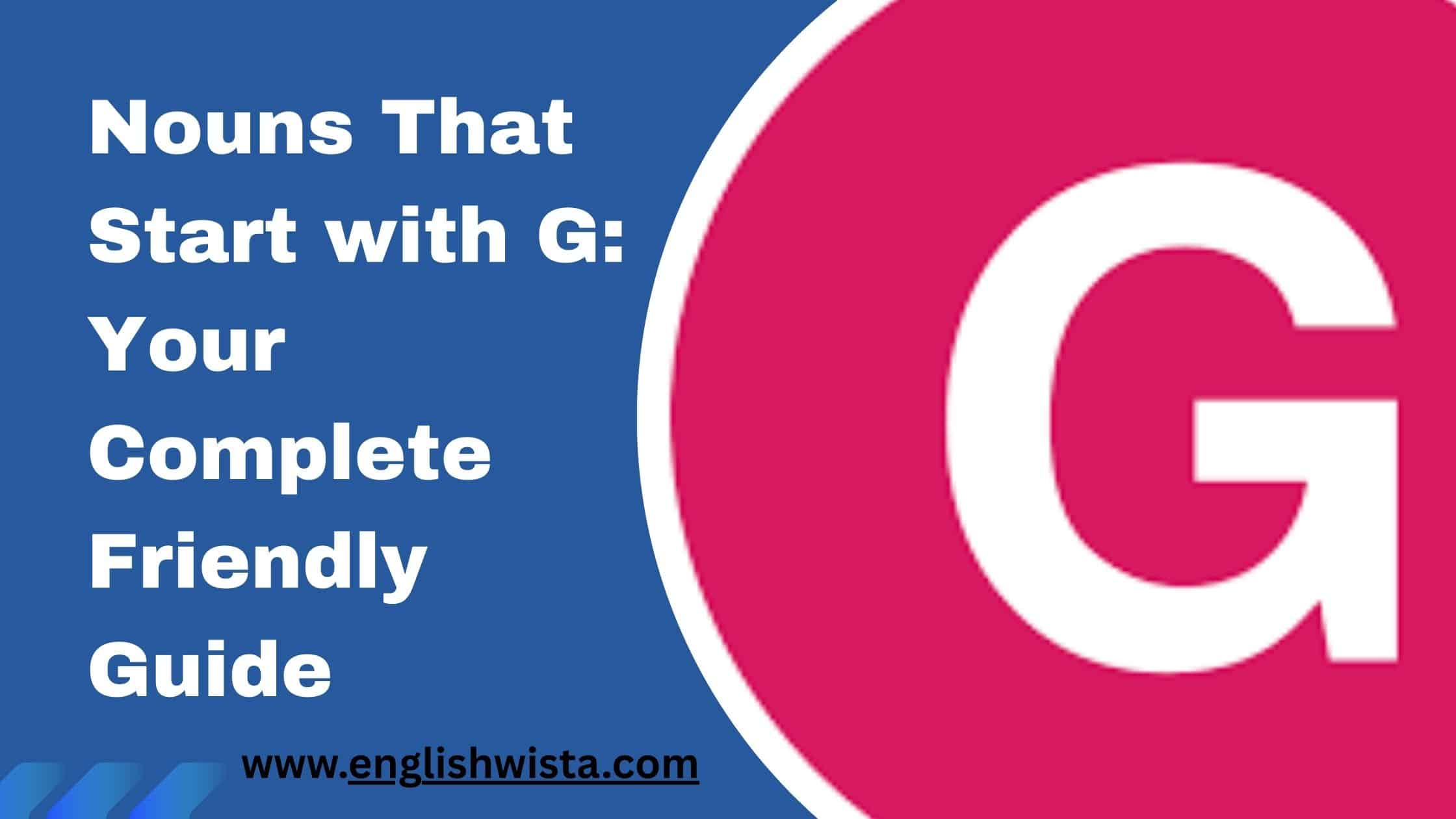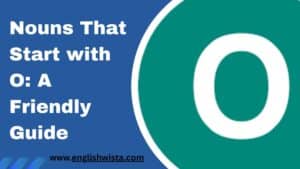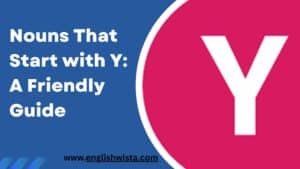Have you ever noticed how many great words in English begin with the letter G? From simple everyday items like glass and game to bigger concepts like growth and generosity, the letter G gives us a wide variety of useful nouns. If you’re learning English, expanding your vocabulary, or just curious about words, exploring nouns that start with G can be both fun and very practical.
In this guide, we’ll walk step by step through the world of G-nouns. We’ll look at their meanings, give clear examples, and share fun facts along the way. Don’t worry about grammar rules everything will be explained in simple, friendly language.
What Are Nouns That Start with G?
Before we dive into lists and examples, let’s remind ourselves what a noun is.
A noun is simply a word that names a person, place, thing, or idea. Nouns are like the building blocks of sentences. Without them, we couldn’t talk about the world around us.
So, nouns that start with G are just nouns whose first letter is the letter G. They can name people (grandmother), places (Germany), things (guitar), or even ideas (gratitude).
Quick definition to remember:
A noun = a naming word.
Let’s take a closer look at G-nouns in different categories.
Common Everyday G-Nouns
Some G-nouns appear in our daily conversations. These are simple, familiar words you’ll hear and use often.
Around the House
- Glass – “Please put the water in a glass.”
- Gate – “The garden gate is open.”
- Glove – “I lost one glove in the snow.”
- Garage – “The car is parked in the garage.”
- Garbage – “Take the garbage out, please.”
People and Relationships
- Girl – “The girl is reading a book.”
- Grandfather – “My grandfather tells amazing stories.”
- Guest – “We have a guest staying for dinner.”
- Groom – “The groom looked nervous at the wedding.”
- Guardian – “She is the legal guardian of the child.”
Places and Locations
- Garden – “The garden is full of flowers.”
- Gym – “He goes to the gym every morning.”
- Gallery – “We visited an art gallery.”
- Glacier – “The glacier is melting due to climate change.”
- Gas station – “We stopped at a gas station for fuel.”
These everyday G-nouns are excellent for beginners. Practice using them in simple sentences to build confidence.
G-Nouns for Emotions and Feelings
The letter G also gives us many nouns that describe how we feel inside. These words are powerful because they help us express emotions.
Positive Emotions
- Gratitude – “She showed gratitude for their help.”
- Gladness – “His heart was full of gladness.”
- Generosity – “Her generosity touched many lives.”
- Grace – “He handled the situation with grace.”
- Glee – “The children danced with glee.”
Challenging Emotions
- Guilt – “He felt guilt after telling a lie.”
- Grief – “They experienced grief after the loss.”
- Glumness – “A sense of glumness filled the room.”
- Grudge – “Holding a grudge can harm you.”
Example sentences:
- “Her generosity inspired the whole community.”
- “He couldn’t hide his guilt after the mistake.”
- “The glee on her face was unforgettable.”
Educational and Academic G-Nouns
If you’re a student, you’ll often hear G-nouns in school and learning settings.
Learning-Related Terms
- Grammar – “English grammar can be tricky, but practice helps.”
- Grade – “She received a good grade on the test.”
- Graph – “The math teacher drew a graph on the board.”
- Glossary – “Look up the word in the glossary.”
- Graduate – “He is a college graduate.”
School and Study
- Group – “We worked in a group for the project.”
- Guide – “The study guide helped me prepare.”
- Goal – “Set a clear goal for your studies.”
- Game – “This word game makes learning fun.”
Example sentences:
- “I studied hard and got a good grade.”
- “The glossary helps me understand new words.”
- “We set a goal to finish the project on time.”
Nature and Environment G-Nouns
The natural world is full of G-nouns too. These help us talk about animals, plants, and landscapes.
Animals
- Goat – “The goat climbed the rocky hill.”
- Goose – “A goose waddled across the yard.”
- Giraffe – “The giraffe reached for the tall leaves.”
- Goldfish – “She keeps a goldfish in a bowl.”
- Gorilla – “The gorilla is a strong and gentle animal.”
Plants and Features
- Grass – “The grass is green after the rain.”
- Grain – “Rice is an important grain.”
- Grove – “We walked through an olive grove.”
- Geyser – “The geyser erupted with boiling water.”
- Gulf – “The Gulf of Mexico is very large.”
Example sentences:
- “The giraffe is the tallest animal on land.”
- “The grass was wet with dew.”
- “The geyser attracts many tourists.”
Food and Eating G-Nouns
Let’s move to the kitchen! Many foods and cooking words start with G.
Foods We Eat
- Grapes – “Would you like some grapes?”
- Garlic – “Add garlic for flavor.”
- Ginger – “Ginger tea is good for health.”
- Granola – “I had granola with yogurt for breakfast.”
- Gooseberry – “Gooseberry jam tastes sweet and sour.”
Cooking and Dining
- Grill – “The grill is ready for burgers.”
- Glassware – “The glassware sparkled on the table.”
- Garnish – “The chef used parsley as a garnish.”
- Guest – “The guest enjoyed the meal.”
Example sentences:
- “Garlic adds great flavor to food.”
- “He grilled the chicken perfectly.”
- “The guest complimented the dinner.”
Technology and Modern Life G-Nouns
In today’s world, technology shapes much of our life. Many useful G-nouns describe these areas.
Digital and Electronic Terms
- Gadget – “This gadget makes cooking easier.”
- Game – “He downloaded a new video game.”
- Graphics – “The graphics on this computer are amazing.”
- Google – “I found the answer on Google.”
- Gigabyte – “The file size is one gigabyte.”
Communication and Media
- Gallery – “I uploaded photos to the gallery.”
- GIF – “She sent a funny GIF.”
- Group chat – “Our group chat is very active.”
- Guidebook – “The guidebook explained everything clearly.”
Example sentences:
- “This gadget saves me time every day.”
- “The graphics in the movie were incredible.”
- “He sent a GIF in the group chat.”
Abstract Concepts and Ideas
Some G-nouns describe big ideas or concepts rather than physical objects.
- Growth – “The company showed steady growth.”
- Goal – “Her main goal is to become a doctor.”
- Game – “Life is sometimes like a game.”
- Gift – “Time is the greatest gift.”
- Grace – “She moved with grace.”
Example sentences:
- “Personal growth is important for everyone.”
- “He reached his goal after years of work.”
- “Friendship is a precious gift.”
Professional and Work-Related G-Nouns
Work and business also use many nouns beginning with G.
Jobs and Careers
- Gardener – “The gardener planted roses.”
- Geologist – “The geologist studied the rocks.”
- Governor – “The governor gave a speech.”
- Guide – “The tour guide explained the history.”
- General – “The general commanded the army.”
Business Terms
- Goods – “The store sells many goods.”
- Grant – “The project received a government grant.”
- Gross – “The company’s gross income increased.”
- Guarantee – “The phone comes with a guarantee.”
Example sentences:
- “The gardener watered the plants daily.”
- “We received a grant for our research.”
- “This product comes with a money-back guarantee.”
Fun Facts About G-Nouns
Here are some interesting extras to make learning more fun:
- Word Origins:
- Garden comes from an old German word meaning “enclosure.”
- Gift has Old Norse roots meaning “something given.”
- Grammar comes from Greek, meaning “the art of letters.”
- Collective Nouns:
- A group of geese is called a gaggle.
- A group of gorillas is called a band.
- A group of goats is called a tribe or herd.
- Multiple Meanings:
- Game can mean a sport, wild animals, or even courage.
- Glass can mean the material, a container, or even a mirror.
- Ground can mean the earth, a reason, or an electrical connection.
Common Mistakes with G-Nouns
Learners sometimes make small mistakes with G-nouns. Let’s clear them up.
- Plural forms:
- Goose → Geese (not “gooses”).
- Gift → Gifts (just add -s).
- Glass → Glasses (careful, this also means eyewear!).
- Uncountable nouns:
- Garbage is uncountable. We say “some garbage,” not “garbages.”
- Grain can be both countable (a grain of rice) and uncountable (a sack of grain).
- Pronunciation tips:
- Genre is pronounced “ZHAHN-ruh.”
- Gesture has a soft “g” sound, like “j.”
Building Your G-Noun Vocabulary
Here are some easy tips to practice and remember more G-nouns:
- Make word lists – Write down 5 new G-nouns every day.
- Use them in sentences – Practice like: “The goat ate grass in the garden.”
- Group by theme – Learn food words together, then animal words, and so on.
- Play games – Word games like crosswords or Scrabble are fun ways to review.
- Notice in real life – Look for G-nouns in books, movies, and conversations.
Conclusion: Growing with G-Nouns
We’ve explored a wide range of nouns starting with G from everyday items like glass and garden to deeper concepts like gratitude and growth. Along the way, we looked at fun facts, common mistakes, and practical examples to make learning easier.
The key takeaway is simple: G-nouns are everywhere in English. They help you talk about people, places, things, and ideas. By practicing them regularly, you’ll grow your vocabulary and feel more confident in using English every day.
So next time you see a goat, a glass, or even feel gratitude, remember you’re adding another G-word to your language toolbox. Keep learning, keep practicing, and enjoy the journey with the great world of G-nouns!



